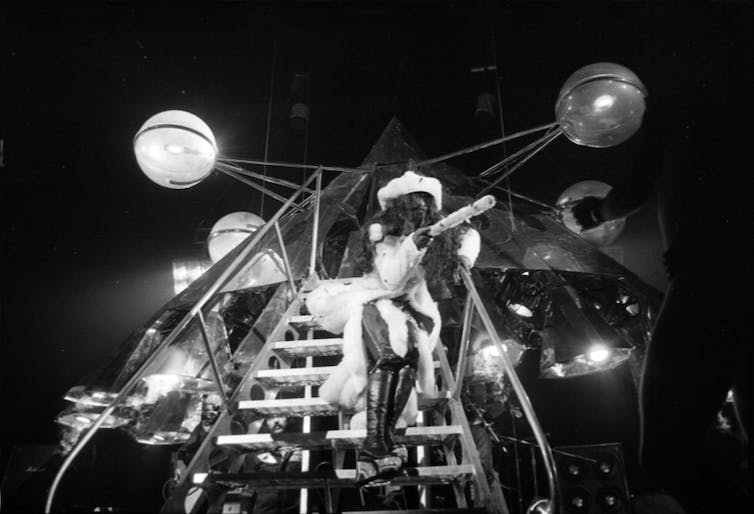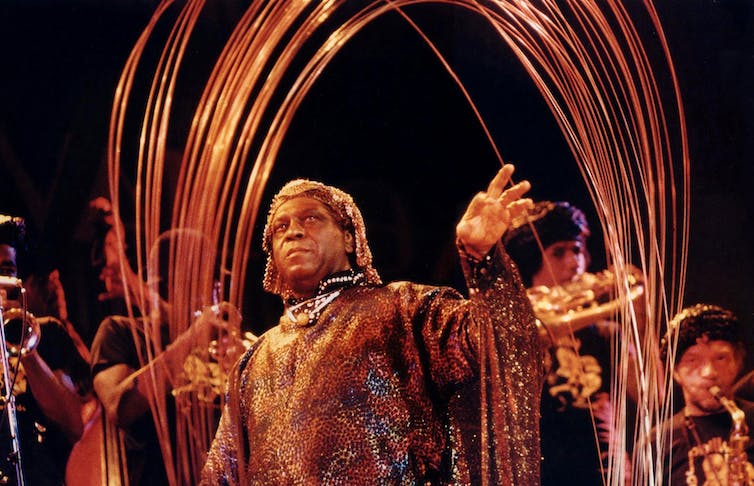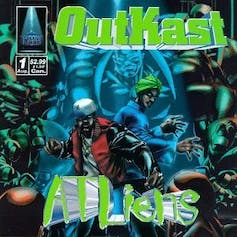by Roy Whitaker, San Diego State University
It is perhaps only natural, as hip-hop celebrates its 50th anniversary, that people look to the genre’s future. But for some rappers, the future has always been part of the story.
Ever since August 1973, hip-hop artists have turned to Afrofuturism – a mix of science fiction, politics and liberating fantasy – to inform their lyrics and their look.
As a professor of African diaspora religious philosophies and a fan of hip-hop, I’ve long been interested in intersections between Afrofuturism and hip-hop. I have found that hip-hop artists from the 1970s onward have employed Afrofuturism as a means to help Black Americans overcome isolation and racism. They do so by taking listeners on journeys in and beyond the here and now, from an often imagined past to an imaginative future. And through that journey comes greater self-clarity, self-empowerment and self-determination.
Black diaspora ancestors
Author and lecturer Mark Dery is credited with coining the term “Afrofuturism” in his 1994 essay “Black to the Future.” In it, he describes the concept as “speculative fiction that treats African-American themes and addresses African-American concerns in the context of twentieth century technoculture.” More broadly, he adds, Afrofuturism uses tech-filled imagery to envision a better future.
Academics have since further explored the meaning of Afrofuturism. In her 2013 book “Afrofuturism: The World of Black Sci-Fi and Fantasy Culture,” independent scholar Ytasha Womack describes the cultural phenomenon as “an intersection of imagination, technology, the future, and liberation.”
Malcolm Ali/WireImage via Getty News
Although the term appeared in the 1990s, Afrofuturism has been applied retroactively to describe Black writers, artists and musicians. In the United States, Afrofuturism was shepherded by generations of Black visionaries from the time of institutional slavery to the Civil Rights era. In fact, it predates hip-hop’s beginnings in 1973, and it developed independently from hip-hop throughout the years.
Octavia Butler, for example – the “mother of Afrofuturism” – decided that it was necessary to write her lived experience into science fiction, which was dominated by white male authors. From the 1970s to 2000s, she combined African mythology with social activism to conjure images of alternate Black worlds.
But perhaps more important in terms of its influence on hip-hop is the music of those associated with Afrofuturism, especially George Clinton, leader of the funk band Parliament-Funkadelic. Clinton blended sonic sounds, wore ornate Pan-African clothing and incorporated spaceship stagecraft called “The Mothership.”

Hip-hop artists often include snippets of Clinton’s music, such as on rapper and producer Dr. Dre’s album “The Chronic.”
Aliens and alienation
Hip-hop artists influenced by Afrofuturism have long been aware that American society made many Black, Indigenous and other people of color feel different – less than human, or even like aliens – and expressed this through their art. And like socially conscious hip-hop, Afrofuturism has always had a political element.
Commentator Taylor Crumpton explains, “Afrofuturism has been woven into social movements that worked against white supremacy to move toward a future where radicalism is viewed, not as something to be fought, but a societal good.”
Numerous Black hip-hop songs that portray strange settings, space travel or life on other planets reinforce Afrofuturism’s emphasis on difference and otherness.

Take, for example, Public Enemy’s “Fear of a Black Planet,” Afrika Bambaataa & Soulsonic Force’s “Planet Rock” or Ras G’s “Brotha From Anotha Planet.” Similar to experimentalist jazz bandleader Sun Ra, who claims aliens selected him to preach cosmic enlightenment on Earth, the Atlanta-based duo Outkast – whose very name suggests alienation – refer to themselves as “ATliens”.

LaFce Records/Discorgs
Such hip-hop artists offer mesmerizing messages, sounds and beats that seem to come from another world. They help listeners see life as an outsider. In so doing, the artists reclaim the alien moniker as an act of resistance.
Higher levels of consciousness
Afrofuturism aims to elevate human consciousness. Like Sun Ra’s jazz fusion ensemble “Akestra,” which deliberately designed music to help people see themselves and the world differently, Afrofuturism seeks to decolonize human minds.
Cultural critic Greg Tate describes how Afrofuturism entered mainstream public awareness in 2018 with the release of the Marvel movie “Black Panther.” The film depicts an African kingdom whose advanced technology leads to a better world.
Kendrick Lamar, winner of the best rap album at the 2023 Grammys, recorded five of 14 songs on the Afrofuturist “Black Panther” movie soundtrack. One of them was “All the Stars.”
Journalist Taylor Hosking noted that in the music video for the song, “Lamar is on a voyage to (and through) Africa that starts in an ark-like vessel with a sea of hands waving below. The hands might call to mind the bodies of those who drowned during the Middle Passage, as well as a crowd of fans at a concert.”
Indeed, Lamar fuses African Americans’ desire to know what Africa was like prior to colonization to a futuristic pilgrimage that reimagines what it would be like to return to one’s ancestral roots.
The journey home may be different for everyone, but knowing the past can enhance one’s understanding of the present and outlook on the future.
Take nothing for granted
In “Africa As an Alien Future,” academic Ruth Mayer observes how Afrofuturism’s collapsing of past, present and future results in “strange sights – alien, aquatic, artificial – which force us not only to reconsider the past, but most of all the present we like to take for granted.”
Tupac Shakur and Dr. Dre’s dystopic video for “California Love,” for example, which was set in California in 2095 and includes a cameo appearance by George Clinton himself, evokes vivid images of turf war battles in a post-apocalyptic, climate change-ridden, desert wasteland with sparse water.
Afrofuturists challenge societal assumptions about Black Americans’ role in their country’s history, both then and in the future. This is a reason why I teach in my “Hip-Hop and Religion” class Tupac’s “Thugz Mansion.” In the song, Tupac not only reaffirms a core tenet of Afrofuturism – Black people will in fact survive and thrive in the future – he also visualizes a realm for them where peace is pervasive:
Dear mama don’t cry, your baby boy’s doing good /
Tell the homies I’m in heaven and they ain’t got hoods /
Seen a show with Marvin Gaye last night, it had me shook /
Drinking peppermint Schnapps, with Jackie Wilson, and Sam Cooke /
Then some lady named Billie Holiday /
Sang sitting there kicking it with Malcolm, ’til the day came /
All in all, Afrofuturism counsels marginalized peoples to reassess past wounds and present injustices, while reassuring them that there are possible futures where they can feel they belong. 
Roy Whitaker, Associate Professor of Africana Philosophy of Religions and American Religious Diversity, San Diego State University
This article is republished from The Conversation under a Creative Commons license. Read the original article.
About Post Author







